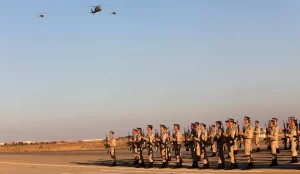Can the IDF Restore Its Ground Forces’ Former Glory and Reel in Quality Recruits?

An Israeli air force graduation ceremony, last year.Credit: Eliyahu Hershkovitz
The plan the Israel Defense Forces unveiled on Sunday seeks to address one of the most difficult problems the army has faced in recent decades: The persistent decline in the quality of the ground forces’ manpower. The best recruits prefer to work in most elite units, whether it is the air force, Sayeret Matkal and other commando units, or in non-combat units like the 8200 cybersecurity unit.
Although the military brass doesn’t like to speak about it publicly, the decline poses a serious threat to its ability to function and reflects a broader manpower crisis. Offensive formations, which once constituted the heart of the IDF (and certainly served as the symbol of its strength and values) have been pushed aside in favor of the army’s other arms, some of which have better reputations and in the longer term offer more lucrative and rewarding post-army career opportunities.
These changes are connected with three other developments. The first is the IDF’s focus on fighting guerilla and terror organizations instead of conventional armies. That has moved the weight of operations to the air force and intelligence at the expense of the ground forces (and has raised questions concerning the need to continue deploying these forces for their original mission of determining the outcome of the conflict.
The second is the growing reluctance of the Israeli public and the country’s leaders to accept battlefield losses, resulting in greater support for long-range weapons over battlefield maneuvering. The third is that a large part of the army’s role today is to police the West Bank – a task that is subject to political controversy and disputes over soldiers’ conduct.
The combination of all these developments has reduced motivation among top prospects to serve in the ground forces. The public isn’t fully aware of the situation. The IDF knows how to measure and quantify the quality of new recruits according to three parameters – physical and cognitive capabilities; character and values; interpersonal and leadership skills.
If you take the names of all of the men who were drafted in the 2022 cohort and arrange them into columns according to the data collected on them, only a small number score in the top decile of all three of these categories. A few scores are in the top two deciles of all three and fewer than 400 will be in the top three deciles.
The key question is where to assign these few hundreds every year. The unfortunate answer today is – not in the ground forces. With a few exceptions, they will end up in the air force, navy, intelligence, or elite units such as Sayeret Matkal, Shayetet, or Shaldag. The ground forces will receive very few of these recruits, although it will get soldiers who dropped out of elite units. Even then, however, the quality of the average soldier in an elite unit remains much higher than company commanders in “regular” units of the ground forces – whether it’s Golani or the Seventh Armored Brigade.
The ground forces commander, Gen. Tamir Yadai, unveiled on Sunday a program called Erez whose goal is to try and close this gap. Starting next year, the IDF will offer 2,500 men in every recruiting cohort to join a new track in the ground forces. The goal is to train 80 soldiers a year in a track that will last six years and eight months (in other words, it will include four years as a career soldier). The soldiers will undergo commando training and complete the officers course, and then be assigned to various ground units. By the end of their service, they will have risen to the rank of company commander and had time to study for a bachelor’s degree.
The program is named for Brig. Gen. Erez Gerstein, who was Yadai’s commander in Golani and was killed in 1999. This is an appropriate memorial for perpetuating the memory of the most prominent and senior IDF combat officer killed in action in the last generation.
The program is ambitious, but, according to the army, it has elicited interest on the part of future recruits to whom it was recently presented. However, it still needs to overcome many obstacles. Will the IDF succeed in selling a military identity to new recruits that rivals the glory of units such as Golani? Can the program overcome the marginal status the ground forces have been relegated to in recent years? And most of all, will 18-year-olds agree to sign on for long-term service in a new and untried program at a time when young people seek the shortest possible commitments.
And lastly, there is one small matter – which was of course not mentioned by Yadai as he isn’t allowed to speak about it. If Tuesday’s election leads to an extreme right-wing government that undermines the justice system and tries to dictate the IDF’s military ethos it will become increasingly difficult to convince young people from opposing ideological backgrounds to enlist for combat to the extent they do today. In that case, the IDF will have to come up with an alternative plan. Perhaps “Bezalel and Itamar” would be an appropriate campaign name.
This article is published in its entirety
